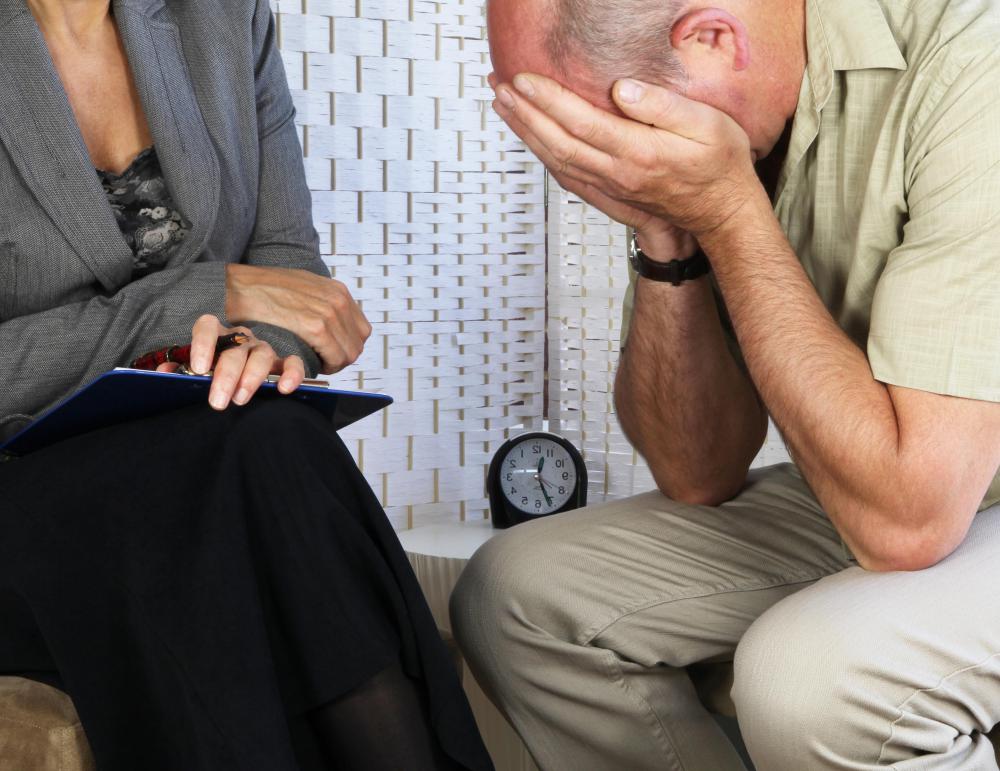At WiseGEEK, we're committed to delivering accurate, trustworthy information. Our expert-authored content is rigorously fact-checked and sourced from credible authorities. Discover how we uphold the highest standards in providing you with reliable knowledge.
What is the Connection Between Alcoholism and Depression?
Alcoholism and depression frequently appear together when people are struggling in one way or another in their lives. It is difficult to pinpoint an exact cause for either one; in some cases, it seems that alcoholism can lead to depression, while in others, it seems that depression can cause one to begin drinking alcohol excessively. There is certainly not always a direct correlation between the two, however, so assumptions should not be made regarding anyone's mental health or decision-making process when considering alcoholism and depression. Sometimes, tendencies toward either illness can run in one's family.
In many cases, however, alcoholism and depression do exist together. Alcohol is a depressant, and if it is consumed to excess on a regular basis, an individual might find that he or she is developing tendencies towards depressive moods or behavior. It can then progress to full clinical depression, which is often made worse if one continues to drink alcohol. It is often recommended that people prone to depression avoid alcohol altogether, because it can quickly exacerbate the condition.

The connection between alcoholism and depression may also occur in the other direction. Some people use alcohol as a method of coping with depression when they feel they don't have any other options, rather than pursuing treatment from a therapist or medication from a physician. Some choose to use alcohol as a way to numb feelings of sadness, anger, anxiety, or other emotions frequently associated with depression.

It is relatively easy, then, to become reliant on alcohol to avoid experiencing feelings of depression. If left unchecked, this can lead to alcoholism. The connections between alcohol and depression are not always straightforward, but they certainly do exist for many people. In addition, it is possible for someone to become depressed if they try to overcome their alcohol dependency on their own, but get discouraged and feel that it is insurmountable.

Alcoholism and depression are often treated with therapy; medication may also be prescribed to treat depression, but it is generally very important that anyone on depression medication stop drinking alcohol to avoid dangerous side effects. Some people find that both individual and group therapy can be extremely beneficial in overcoming alcoholism and depression. Both alcoholism and depression can be lifelong conditions, but with the proper treatment, they can be completely managed and no longer need to negatively impact one's life.
AS FEATURED ON:
AS FEATURED ON:















Discussion Comments
Drentel -That is a sad story. I have several friends from my younger days who are going through similar situations as your friend. Adolescents and depression is a scary combination.
I'm glad to read your friend is getting treatment for both depression and alcoholism. When both conditions are not addressed a person can swing back and forth from one to the other; and often times both are present at the same time.
I guess most people will be able to relate to what I am about to write--even if you did not attend college. When I was in college, drinking was just another way of passing the time: class, study, ballgame, party/drink...
Nobody worried about how much anyone had the night before at the party after the football game. In fact, the ability to "hold your liquor" was looked at as a great quality. Anyway, a few years after college I met one of the guys we used to party with in college. He told me he was going through alcoholism and depression treatment. He had been diagnosed with depression when he was in high school.
He went on to tell me he had never drank when he was in high school, and the reason he drank in college was it made him feel better, at least while he was partying. He also said he would feel lousy the next day and days after, but that was his way of coping.
When we were in college we just thought he was a wild party animal. Anyway, for him, the depression came before the alcoholism and the alcoholism stemmed from the depression.
I guess this can be chalked up to another case of the chicken and the egg. Which comes first, the alcoholism or the depression? In this instance, I guess the answer would depend on the individual. There are so many causes of alcoholism and depression. Getting to the root of it all can be like blindly running about an elaborate maze.
Post your comments